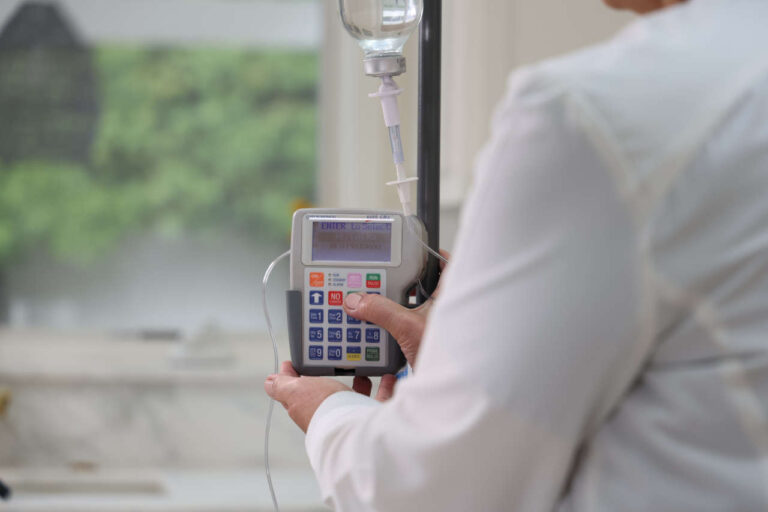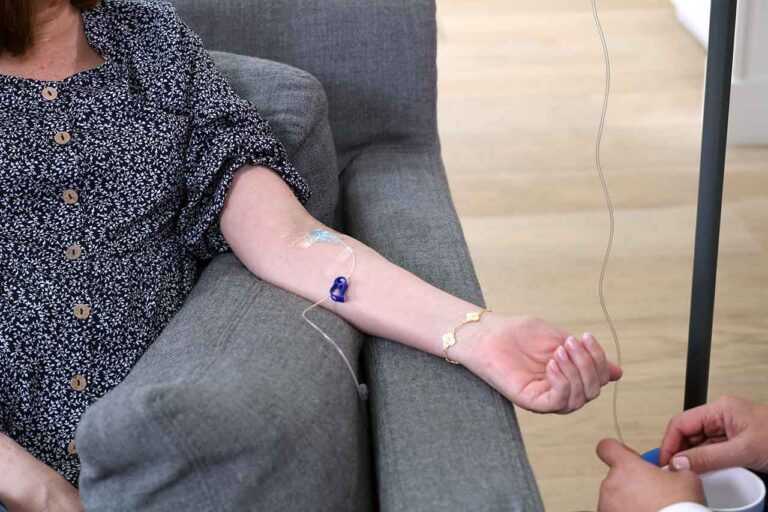
Neonatal alloimmune thrombocytopenia (NAIT) is a rare but serious immune disorder that affects fetuses and newborns. According to a 2021 review, NAIT affects 1 in every 1,000 live births in the U.S. [1]
Makipag-usap sa isang Espesyalista Tungkol sa Tulong sa Copay
Neonatal alloimmune thrombocytopenia (NAIT) occurs when the mother’s immune cells attack and destroy the baby’s platelets. As a result, the baby’s platelet count drops in a condition known as thrombocytopenia.
Severe thrombocytopenia increases the risk of bleeding into the baby’s brain (intracranial hemorrhage) and other vital organs.
NAIT is also known by other names:
- Fetal and neonatal alloimmune thrombocytopenia (FNAIT)
- Fetomaternal alloimmune thrombocytopenia (FMAIT)
What Are the Symptoms of Neonatal Alloimmune Thrombocytopenia?
Symptoms can appear before birth or up to a month after, and they can vary depending on the degree of platelet drop in the baby’s blood.
The most common signs are purple-colored spots in the skin (petechiae and purpura). They usually appear within a few hours following birth. Other signs can include easy bruising and excessive bleeding.
Mild symptoms typically resolve with time and after appropriate treatment. Some babies may have no signs other than a low platelet count. However, severe cases (where bleeding occurs in the brain, digestive tract, lungs, or eyes) can lead to death or long-term disability.
Some babies with severe NAIT may have a bulge on the head, which can indicate blood accumulation under the scalp (cephalohematoma) [2].
What Causes Neonatal Alloimmune Thrombocytopenia?
Platelets have molecules on their surface called human platelet antigens (HPAs). A baby inherits half of these HPAs from the father and half from the mother [3].
During the course of pregnancy, the baby’s platelets can cross the placental barrier and reach the mother’s bloodstream without causing any issues.
However, in NAIT, the mother’s immune system fails to recognize HPAs obtained from the father. Consequently, the mother’s immune cells produce antibodies (anti-HPAs) that destroy the baby’s platelets. The exact reason behind this is still unknown.
Diagnosis
NAIT is often underdiagnosed.
Routine screening is not practiced unless there is a family history of the condition. For NAIT occurring in the first pregnancy, diagnosis is delayed until further testing following birth.
If your child’s doctor suspects this condition, they may order a complete blood count (CBC) for your newborn.
Diagnostic tests can include:
HPA testing
HPA testing includes a blood test to determine if the mother’s blood has anti-HPA antibodies. HPA genotyping of both parents and the newborn helps determine if their respective HPAs are compatible.
If thrombocytopenia occurred in the previous pregnancy, your doctor will test the fetus. For this, they will draw a fluid sample from the amniotic sac to determine your baby’s platelet antigen type.
Ultrasound
An ultrasound uses sound waves to visualize the fetus and look for signs of bleeding.
Get IVIG Copay Assistance | IVIG Financial Assistance
Neonatal Alloimmune Thrombocytopenia: What Are the Treatment Options?
Treatment varies depending on symptom severity, the fetus’s gestational age, and the timing of diagnosis (before or after birth).
Experts recommend initiating treatment in newborns with very low platelet levels, regardless of whether NAIT is confirmed.
Prenatal treatment options
For NAIT diagnosed before birth or if the fetus is at a higher risk, doctors may give the mother:
- Intravenous Immunoglobulin (IVIG)
- Steroids
- Serial intrauterine platelet transfusions (IUPT)
IVIG and steroids suppress the mother’s immune system and prevent it from producing antibodies against the baby’s platelets.
IUPT is invasive and can harm the fetus. Thus, doctors typically use it only when the symptoms don’t improve with IVIG or steroids.
Postnatal treatment options
Newborns with NAIT may need IVIG or platelet transfusions to increase their platelet levels. All newborns with NAIT must get a head ultrasound to find out whether there is an absence of intracranial bleeding.
Neonatal Alloimmune Thrombocytopenia: FAQs
What is the difference between autoimmune and alloimmune thrombocytopenia?
In autoimmune thrombocytopenia, the antibodies that work against the mother’s platelets also attack the baby’s platelets. On the other hand, alloimmune thrombocytopenia occurs when the mother’s immune system produces antibodies specifically against the baby’s platelets.
What is the cause of NAIT?
In NAIT, a mother’s immune system produces antibodies against the paternally-derived human platelet antigens (HPAs) in the baby’s platelets.
Does NAIT increase the risk of miscarriage?
Miscarriage and stillbirth are the most devastating consequences of NAIT. IVIG is one of the gold-standard therapies for at-risk pregnancies.
MGA SANGGUNIAN:
- Norton, Tonya et al. “Neonatal Alloimmune Thrombocytopenia: A Concise Review.” Advances in neonatal care: official journal of the National Association of Neonatal Nurses vol. 21,2 (2021): 115-121. doi:10.1097/ANC.0000000000000775
- National Organization for Rare Disorders. “Fetal and Neonatal Alloimmune Thrombocytopenia – Symptoms, Causes, Treatment | NORD.” National Organization for Rare Disorders, 20 Nov. 2023, rarediseases.org/rare-diseases/fetal-and-neonatal-alloimmune-thrombocytopenia.
- Regan, F et al. “Prenatal Management of Pregnancies at Risk of Fetal Neonatal Alloimmune Thrombocytopenia (FNAIT): Scientific Impact Paper No. 61.” BJOG : an international journal of obstetrics and gynaecology vol. 126,10 (2019): e173-e185. doi:10.1111/1471-0528.15642













